The evolution of Mad Men as seen through the show's promotional posters
Deciphering plot clues from the series' compellingly sparse artwork
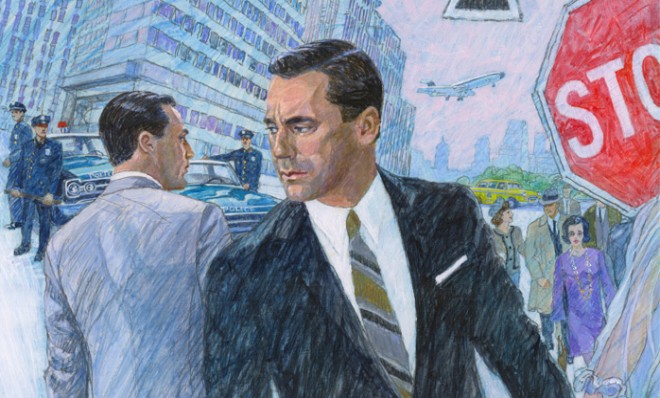
The critically acclaimed AMC drama Mad Men enters its sixth and second-to-last season with a special two-hour premiere on Sunday, April 7. And with Mad Men creator Matt Weiner as tight-lipped as ever, fans are trying to satiate themselves with what little crumbs they can get their hands on. Yesterday, that morsel took the form of a beautifully illustrated promotional poster (see it above). What can we infer from this artwork? Well, let's start by identifying what the posters of seasons past taught us.
SEASON 1
A dark seated figure, his back to the viewer, looks out onto a white abyss while casually dangling a cigarette. He is positioned above a darkened cityscape, almost as if he's lording over it. The possibilities seem as vast as the white space our opaque figure looks out onto.
The Week
Escape your echo chamber. Get the facts behind the news, plus analysis from multiple perspectives.

Sign up for The Week's Free Newsletters
From our morning news briefing to a weekly Good News Newsletter, get the best of The Week delivered directly to your inbox.
From our morning news briefing to a weekly Good News Newsletter, get the best of The Week delivered directly to your inbox.
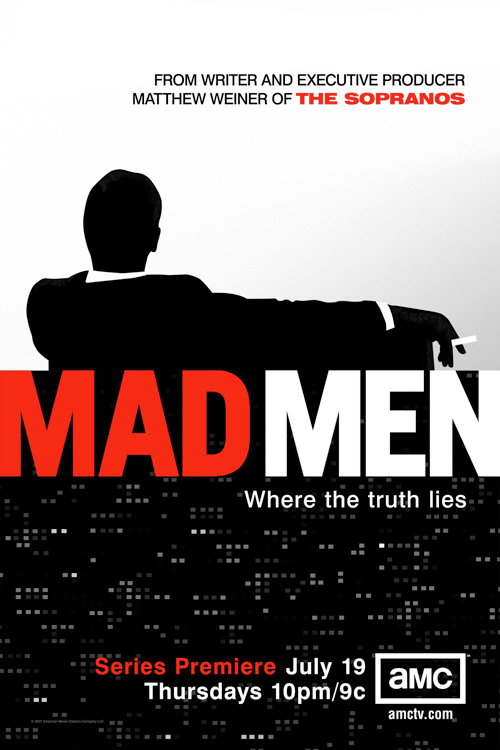
Once the season begins, the world is introduced to Don Draper, the impossibly cool advertising genius and the envy of seemingly all the men on Madison Avenue as New York City enters the swinging 1960s. Like the shadowy man depicted in the poster, Don is a man of secrets, the least of which revolve around the women he hides from his repressed suburban wife, Betty. We later find out that Draper's real name is Dick Whitman, and his childhood was a lowly one that forced a frightened Dick into the shadow of an abusive father. He escapes his seemingly inevitable life of depression and reinvents himself by assuming the name of Lieutenant Donald Draper during the Korean War. But even after this subversive rechristening, Don is starkly fractured. He's found professional and sexual success, but his personal and home life is terribly unfulfilling. These two realities are as black and white as the poster promised. The season closes with Don sitting alone at the bottom of his front stairs in his dark and empty home on Thanksgiving.
**
SEASON 2
A rush of commuters, move up the Grand Central stairs toward the light of day. Don, no longer a flat illustration, is frozen in the middle of the pack. A light illuminates him, causing him to sharply stand out from the hazy crowd.
A free daily email with the biggest news stories of the day – and the best features from TheWeek.com

Just as the poster suggests, Don is lost in an otherwise fast-paced life. One of his affairs taints not only his reputation but also, finally, his marriage. He and Betty temporarily separate and Don seeks solace in a California friend, Anna, who is the widow of the real Don Draper. Meanwhile, Don's employer, Sterling Cooper, is bought out by a London advertising agency. Don doesn't want to go with the flow, and threatens to leave. Betty and Don finally reunite under tense circumstances, with his wife informing him she's pregnant for a third time (with a child that might not be his). Just as the busy crowd in the poster threatens to swallow him whole, Don is being consumed by forces — the London company, the new baby — outside his control.
**
SEASON 3
Don strikes a similar pose to his illustrated self from the first season's poster — sitting in a chair, cigarette poised in hand. But this time, he is fully formed, front-facing, staring directly at us. And instead of sitting grandly on top of his city, Don appears trapped in a flooded office. Despite the threatening waters, Don stares sternly ahead.
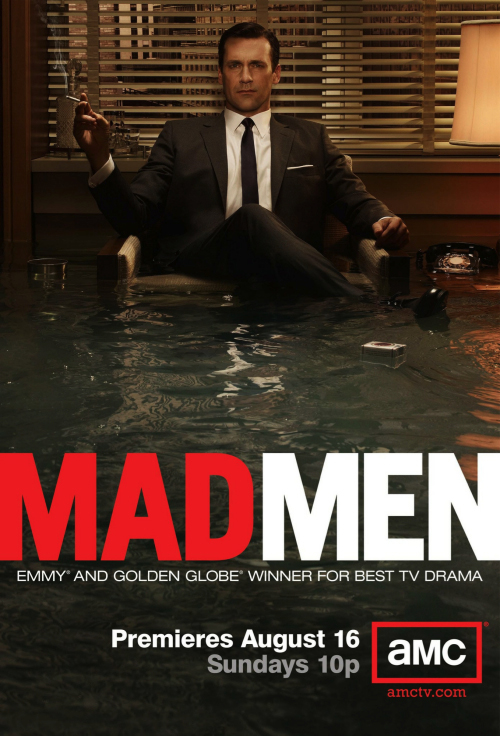
It's easy to see why Don might feel like he's drowning: He's under immense pressure to handle a huge but needy account, that of hotel giant Conrad Hilton, who calls Don constantly at home. Tensions between the company and its biggest customer, Lucky Strike, mount, and young executive Pete Campbell threatens to leave when a colleague gets the position he covets. Betty pokes a hole in Don's facade when she picks his desk lock and finds the evidence of his former self, which Don is then forced to reveal. Betty then seeks a divorce and plans to marry her flirtatious suitor, Henry Francis. And just as the flood gates at Sterling Cooper truly begin to open, with the firm on the edge of yet another buyout, Don and his allies hatch a plan for a life boat, purchasing the company themselves. The season ends with a small group of former Sterling Cooper employees holed up in a hotel room. The phone rings, and Joan answers: "Sterling Cooper Draper Pryce."
**
SEASON 4
Don stands alone in his new digs. He is sure-footed, looking down on Madison Avenue, once again, from great heights. But the emptiness in the office is alarming. It represents either the potential of what may fill it, or the failure of what never could. The only item joining Don, besides his faithful cigarette, is a phone, the chord pulled out from the wall.
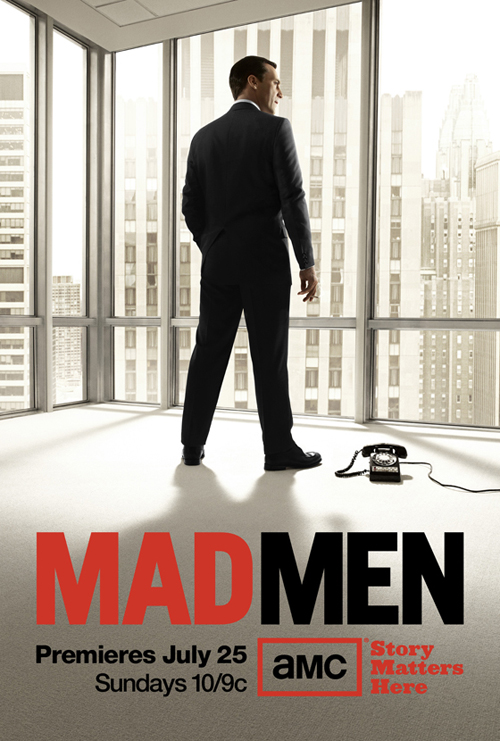
We find Don very much alone, and, awkwardly, forced to analyze who he is for in an interview with Advertising Age magazine. The inquiry and article don't go over well, and the nascent Sterling Cooper Draper Pryce is already seen as struggling. Don and the company only spiral from there. Roger Sterling loses Lucky Strike, which drastically depletes the firm's clients and finances. Don, now living alone in a dark, grungy New York apartment, sees prostitutes and drinks to the point of blacking out. He loses Anna — potentially his only lifeline as the one person who knew and liked the real him — to cancer and becomes destructively paranoid about the CIA finding out about his secret past. Instead of confronting his fears, he severs ties with anyone who encouraged him to do so, and ends up doing what Don does best — distracts himself with another girl, this time his secretary, Megan. Don hastily proposes, and the season ends with Don's body tethered to Megan in bed, but his mind at a distance, his face turned toward the window.
**
SEASON 5
We see the silhouetted figure from Mad Men's opening credits in the midst of his seemingly endless descent. The whiteness of the void is an unsettling symbol for the callous, uncaring whims of fate, and an open invitation to draw hilarious graffiti on the poster.

Though the silhouette resembles Don more than any of the series' other characters, the idea of a freefall ended up applying to virtually every character during the fifth season. Don coasted at work and began to doubt his relationship with Megan. Roger exited his marriage to embark on a more fulfilling relationship with LSD. Pete had a brief, misguided affair with a fellow commuter's wife. Joan submitted to a disgusting offer in order to secure a better life for herself. And poor Lane Pryce got into so much trouble financially that he succumbed to depression and hanged himself in his office. Despite rampant speculation by fans, nobody actually jumped out of a window — but it's safe to say that most of these characters are falling in one way or another.
**
SEASON 6
The sketched-in "bubble and streak" poster was drawn by 75-year-old Brian Sanders — a man who actually worked in magazine illustration during the era Mad Men depicts. The poster shows a dark-suited Don walking away from Madison Avenue, holding hands with a woman, as he passes a light-suited double of himself walking in the opposite direction. Three police officers stand in the background.
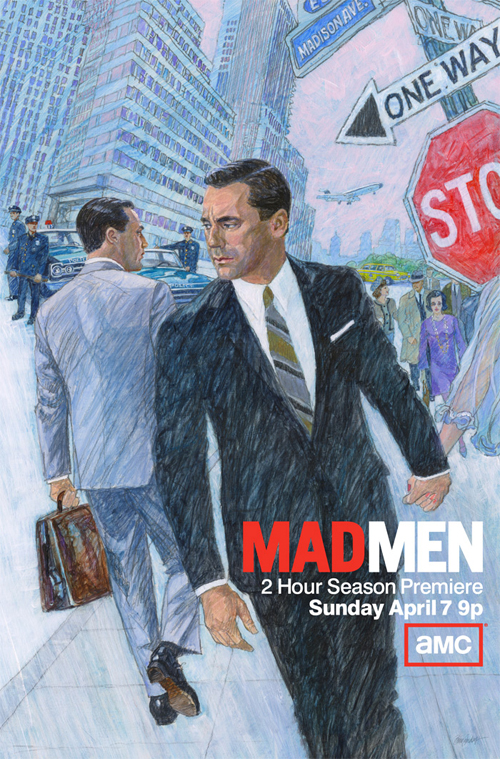
Of course, we don't actually know what's going to happen — and series creator Matt Weiner is notoriously silent about plot details. But we can infer a few things from this intriguing, surreal poster. The two Dons probably symbolize our protagonist's internal battle; the one walking away from Madison Avenue holds the hand of a woman, and the one walking toward Madison Avenue holds a briefcase, which suggests a conflict between Don's personal life and his work. And as for the police: Is it possible that Don's shady past has finally caught up with him? We'll be tuning in on April 7 to find out.
Scott Meslow is the entertainment editor for TheWeek.com. He has written about film and television at publications including The Atlantic, POLITICO Magazine, and Vulture.
-
 Dive right into these 8 underwater adventures
Dive right into these 8 underwater adventuresThe Week Recommends It’s time to make a splash
-
 The world’s oldest rock art reveals hints about human migration
The world’s oldest rock art reveals hints about human migrationUnder the Radar The art is believed to be over 67,000 years old
-
 Grok in the crosshairs as EU launches deepfake porn probe
Grok in the crosshairs as EU launches deepfake porn probeIN THE SPOTLIGHT The European Union has officially begun investigating Elon Musk’s proprietary AI, as regulators zero in on Grok’s porn problem and its impact continent-wide


